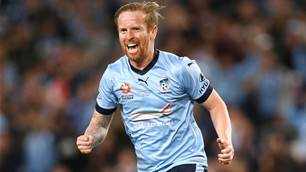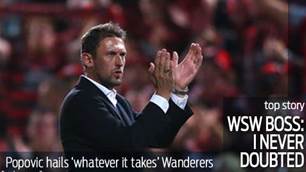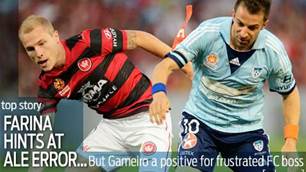Despite measuring just five feet five inches, Sydney FC’s new Brazilian Juninho is looking to make a big impact in the A-League.
Page 2 of 2 | Single page
But then you had a triumphant return to Middlesbrough in 2004 where you helped them lift their first ever trophy, the League Cup. Did you feel like it was mission accomplished?
I was very happy to be part of the team that won our first ever title. That’s what I went there for, and maybe I couldn’t help the team win something the first time I was there but I was able to do it the third time! It was obviously a team effort but it was like a dream come true for me to win something with Middlesbrough.
You’ve played in many leagues in the world. Which one do you think is most suited to your style of play?
I think on paper you would have to say La Liga in Spain would be the league that is most suited to my style of play as it’s very technical and the play tends to build up a little slower than in England. But practically I did very well in England and played some of my best football so I would say personally that the Premier League was the best.
And of course, you are a World Cup winner, playing in the side that won in 2002. But you weren’t one of the favourites to win, were you?
It was an interesting tournament because we were not one of the favourites to win it that year. France had won the previous final and the European Championships in 2000 and Argentina had a very strong team as well. And we had a very tough qualifying series to get there – we only qualified in our last game so it was a long road to get there. There was a lot of pressure on us and many people said that we weren’t going to do well in the tournament. But we had a good manager in [Luiz Felipe] Scolari and we worked very hard to get better. I think it created a lot more excitement in the team and made us want to play better because no-one thought we would win. Not like compared to the last World Cup when Brazil went there as the favourite – 2002 was the opposite.
But the fans at home in Brazil always expect you to win…?
Yes, that’s true. There is always a lot of pressure on the Brazilian team to win every game they play. The supporters can be impatient sometimes with the team and that creates pressure on the team. But we grow up with those expectations so I think every Brazilian player knows how to cope with pressure in the game.
What’s it like on the day of a World Cup Final? Do you have time to take it all in or does it go by too quickly?
Sometimes when you are inside of a situation you don’t realise what is outside. You can be so close that you don’t realise just how big something is and that’s how the Final was for me. I had the opportunity to watch Brazil on the outside in a World Cup and also be part of one and it’s totally different. You don’t think much about what it means to the outside world – you just have to treat it as a normal game as that’s the only way you can handle it. That’s how we approached the Final. We concentrated on it very hard but we also went to the bus very happy and played samba music and singing in the changing rooms. It was a good atmosphere before the game.
You got on the pitch for the final 10 minutes of the game too.
Yes, that was fantastic. The game was incredible but the parties all over Brazil afterwards were amazing. It was very special to be able to go back to our country with the trophy and celebrate with all of our fans.
Now you’re here in Sydney. What motivated you to come to Australia to play?
I think it’s important to have a manager who wants you to be there. I had that at Middlesbrough and it was the same with Sydney. They showed a lot of interest in me and the manager was very sure he wanted me to play for him. When I was in Brazil I didn’t realise what a “marquee” player was but it was explained to me and I liked the idea of taking that position at Sydney.
And of course, having a World Cup winner playing in the A-League helps to promote the game here.
The football league is only beginning in Australia and there needs to be a lot of promotion still in the game. I am aware of that side of being a footballer in Australia and I’m happy to be a part of the A-League. Individually Australia has a lot of talented players like Harry Kewell, Mark Schwarzer, Paul Okon, but we still need to make the league better. We need to be at a point where other people say “Australia plays football too”. And that’s one of the reasons I am here.
What do you think you will bring to Sydney FC?
I’ve never changed the way I play, whether I have been in Brazil, England, Spain or Scotland. I like to play very vertical [direct] but also to be constructive in what I do with the ball. To do lots of flicks or things like that is not so constructive. I want to create goals for the team and maybe score some myself too. I have adapted my game a little because I’m not as quick as I was when I was 22 or 23 years old, but I like to play the same way. And when you are young you run a lot and make a lot of stupid runs but not get the ball. I think now I’m more mature and don’t run after everything! I know where I have to run now and maybe not take as many risks as I once did.
You’ve got a lot of experience in the game. Is teaching some of the younger players something you can do?
Well, not teaching, as I’m not here to teach. I think it’s more to show the players how I do things and maybe how to see the game before they have the ball. And I don’t think the players need teaching, everyone here knows how to play football.
So you’ve been impressed with the standard of football here?
Yes, in training the standard is very high and the side has some very good individual players. They have all the techniques and good control of the ball. And we are doing some great training sessions where we can see how we all play and come together as a team. I have always played as an attacking midfielder in my career – linking the midfield with the strikers – but where I play with Sydney that is up to Branko as he will assess the best position for me to play.
You’re one of a few Brazilians to sign for A-League clubs this season. Is it good to be part of the “samba revolution”?
Well I definitely don’t think the revolution is because of me! There have always been Brazilians in the league but it is good that there are so many coming to play here this year. And there is a history of Brazilians going to other leagues – there are many playing in England and Spain. I think if Brazilian players do well in Australia it will make it even easier for clubs to attract them to come here. Having said that, I do think it’s easier for a midfielder like myself to settle into the Australian style of football than a defender or attacker because we have a different way of playing those positions. Maybe sometimes it is harder.
What are you looking forward to most about being in Sydney?
Everyone I’ve met has said great things about Australia and from what I’ve seen so far they are right. And I wanted to give my family a nice style of life and the way that people live here is a similar way to how we live in Brazil. The weather is nearly the same, we like to spend time outdoors with our families, so I think my family and I will adapt very quickly.
I was very happy to be part of the team that won our first ever title. That’s what I went there for, and maybe I couldn’t help the team win something the first time I was there but I was able to do it the third time! It was obviously a team effort but it was like a dream come true for me to win something with Middlesbrough.
You’ve played in many leagues in the world. Which one do you think is most suited to your style of play?
I think on paper you would have to say La Liga in Spain would be the league that is most suited to my style of play as it’s very technical and the play tends to build up a little slower than in England. But practically I did very well in England and played some of my best football so I would say personally that the Premier League was the best.
And of course, you are a World Cup winner, playing in the side that won in 2002. But you weren’t one of the favourites to win, were you?
It was an interesting tournament because we were not one of the favourites to win it that year. France had won the previous final and the European Championships in 2000 and Argentina had a very strong team as well. And we had a very tough qualifying series to get there – we only qualified in our last game so it was a long road to get there. There was a lot of pressure on us and many people said that we weren’t going to do well in the tournament. But we had a good manager in [Luiz Felipe] Scolari and we worked very hard to get better. I think it created a lot more excitement in the team and made us want to play better because no-one thought we would win. Not like compared to the last World Cup when Brazil went there as the favourite – 2002 was the opposite.
But the fans at home in Brazil always expect you to win…?
Yes, that’s true. There is always a lot of pressure on the Brazilian team to win every game they play. The supporters can be impatient sometimes with the team and that creates pressure on the team. But we grow up with those expectations so I think every Brazilian player knows how to cope with pressure in the game.
What’s it like on the day of a World Cup Final? Do you have time to take it all in or does it go by too quickly?
Sometimes when you are inside of a situation you don’t realise what is outside. You can be so close that you don’t realise just how big something is and that’s how the Final was for me. I had the opportunity to watch Brazil on the outside in a World Cup and also be part of one and it’s totally different. You don’t think much about what it means to the outside world – you just have to treat it as a normal game as that’s the only way you can handle it. That’s how we approached the Final. We concentrated on it very hard but we also went to the bus very happy and played samba music and singing in the changing rooms. It was a good atmosphere before the game.
You got on the pitch for the final 10 minutes of the game too.
Yes, that was fantastic. The game was incredible but the parties all over Brazil afterwards were amazing. It was very special to be able to go back to our country with the trophy and celebrate with all of our fans.
Now you’re here in Sydney. What motivated you to come to Australia to play?
I think it’s important to have a manager who wants you to be there. I had that at Middlesbrough and it was the same with Sydney. They showed a lot of interest in me and the manager was very sure he wanted me to play for him. When I was in Brazil I didn’t realise what a “marquee” player was but it was explained to me and I liked the idea of taking that position at Sydney.
And of course, having a World Cup winner playing in the A-League helps to promote the game here.
The football league is only beginning in Australia and there needs to be a lot of promotion still in the game. I am aware of that side of being a footballer in Australia and I’m happy to be a part of the A-League. Individually Australia has a lot of talented players like Harry Kewell, Mark Schwarzer, Paul Okon, but we still need to make the league better. We need to be at a point where other people say “Australia plays football too”. And that’s one of the reasons I am here.
What do you think you will bring to Sydney FC?
I’ve never changed the way I play, whether I have been in Brazil, England, Spain or Scotland. I like to play very vertical [direct] but also to be constructive in what I do with the ball. To do lots of flicks or things like that is not so constructive. I want to create goals for the team and maybe score some myself too. I have adapted my game a little because I’m not as quick as I was when I was 22 or 23 years old, but I like to play the same way. And when you are young you run a lot and make a lot of stupid runs but not get the ball. I think now I’m more mature and don’t run after everything! I know where I have to run now and maybe not take as many risks as I once did.
You’ve got a lot of experience in the game. Is teaching some of the younger players something you can do?
Well, not teaching, as I’m not here to teach. I think it’s more to show the players how I do things and maybe how to see the game before they have the ball. And I don’t think the players need teaching, everyone here knows how to play football.
So you’ve been impressed with the standard of football here?
Yes, in training the standard is very high and the side has some very good individual players. They have all the techniques and good control of the ball. And we are doing some great training sessions where we can see how we all play and come together as a team. I have always played as an attacking midfielder in my career – linking the midfield with the strikers – but where I play with Sydney that is up to Branko as he will assess the best position for me to play.
You’re one of a few Brazilians to sign for A-League clubs this season. Is it good to be part of the “samba revolution”?
Well I definitely don’t think the revolution is because of me! There have always been Brazilians in the league but it is good that there are so many coming to play here this year. And there is a history of Brazilians going to other leagues – there are many playing in England and Spain. I think if Brazilian players do well in Australia it will make it even easier for clubs to attract them to come here. Having said that, I do think it’s easier for a midfielder like myself to settle into the Australian style of football than a defender or attacker because we have a different way of playing those positions. Maybe sometimes it is harder.
What are you looking forward to most about being in Sydney?
Everyone I’ve met has said great things about Australia and from what I’ve seen so far they are right. And I wanted to give my family a nice style of life and the way that people live here is a similar way to how we live in Brazil. The weather is nearly the same, we like to spend time outdoors with our families, so I think my family and I will adapt very quickly.
 |
| Juninho the World Cup winner |
Related Articles

A-League stars among most travelled footballers in the world

Popovic hails 'whatever it takes' Wanderers













